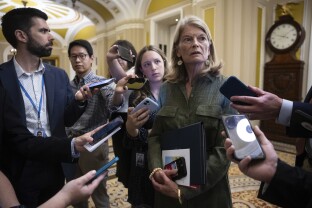After more than 24 hours of voting, Senate leaders agreed to kill a controversial tax targeting the wind and solar industry in an apparent effort to help secure Alaska Sen. Lisa Murkowski’s critical support on the reconciliation bill.
The origins of the proposal, which no one in Congress had publicly considered before Friday, remain a mystery to members of Congress and to outside experts involved in negotiations on the bill. The provision would have placed an excise tax on wind and solar projects that rely on a certain percentage of materials from China, alongside even greater restrictions on the clean energy tax credits for renewable sources of energy.
Members of both parties, energy experts and business leaders spent the weekend maligning the plan, warning that it would raise electricity prices and stifle the buildout of new energy projects when the country needs them most for artificial intelligence infrastructure. Almost all wind and solar projects would be subject to the tax because it is nearly impossible to build them without materials from China.
On Monday, Murkowski co-sponsored an amendment with Iowa Sens. Joni Ernst and Chuck Grassley to address both the excise taxes and the heightened credit restrictions. The new text introduced just before the final vote mirrors much of the amendment from the three senators.
Tuesday’s changes were a victory for the critics of the tax — including more traditional conservatives who saw it as a slippery slope for Democrats to attack fossil fuels in the future — but not entirely for the most moderate Republicans. Before the weekend, moderate Republicans were still pushing for even looser restrictions on the clean energy tax credits. The weekend’s restructuring stunned senators like Murkowski and Thom Tillis, moving the goalposts to focus on undoing the mysterious changes.
After Tuesday’s edits, the bill is in many ways back to where it was last week, with stronger protections for geothermal energy, nuclear power, hydrogen, and carbon capture and storage, and a still-quick phaseout of solar and wind credits, electric vehicle credits, and residential electricity and efficiency support. It does also make some modifications to address criticisms that restrictions on materials from China had made the tax credit nearly unusable.
Even last week’s version of the bill was forecast to significantly spike electricity rates in many of the most conservative states, including Oklahoma, Missouri, Kentucky, South Carolina and Texas, according to a CNN analysis. Almost all of the proposed new energy projects across the country will be shaped by the changes in the reconciliation bill, and many may become more expensive or be canceled as a result, lobbyists for the renewables industry warned in the weeks leading up to Tuesday’s vote.
—
Anna Kramer is a reporter at NOTUS.
Sign in
Log into your free account with your email. Don’t have one?
Check your email for a one-time code.
We sent a 4-digit code to . Enter the pin to confirm your account.
New code will be available in 1:00
Let’s try this again.
We encountered an error with the passcode sent to . Please reenter your email.


